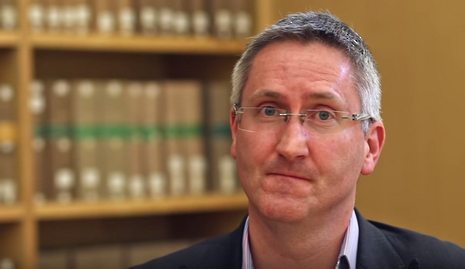Legally recognise universities as ‘critic and conscience of society’, says Pro-Vice-Chancellor
Professor Graham Virgo’s comments add to the already highly controversial Higher Education and Research Bill

Professor Graham Virgo, the Pro-Vice-Chancellor for Education at the University of Cambridge, has called for the inclusion of a clause in the Higher Education and Research Bill, currently before Parliament, which would require universities to act as a ‘conscience and critic’ of society.
Writing in Times Higher Education, the Pro-Vice-Chancellor, who is also a Professor of English Private Law and a Fellow of Downing College, argued that the clause could address “popular scepticism about expertise”, uphold institutional autonomy, permit academics to combat misinformation in the public sphere, and preserve standards of education in new institutions.
He stated that the clause “would not involve the imposition of any legally enforceable duties”, but “would acknowledge the justifiable expectation of the state that universities should make a vital contribution to society.”
Ideally, he explained, it would require that institutions “encourage those working in them to engage in public discussion and embrace the freedom to develop new ideas, test received wisdom and examine controversial and unpopular positions.”
“...the need for universities, and those who work in them, to challenge and criticise publicly is greater than ever.”
He cited as an example the 1989 Education Act in New Zealand, which declared the role of ‘critic and conscience of society’ a defining feature of a university. This function is taken seriously in the country: a report by the New Zealand Universities Academic Audit Unit suggested that it is a key safeguard of academic freedom and “central to what universities exist for”.
Summarising the advantages of enshrining the ‘critic and conscience’ role in law, Professor Virgo noted "the denigration of the views of 'experts' by certain supporters of the Trump and Brexit campaigns", and argued that as a result “the need for universities, and those who work in them, to challenge and criticise publicly is greater than ever.”
He also cited concerns expressed by some universities that the Bill may infringe upon academic freedom, contending that these fears could be subdued by recognition of “the legal responsibility of a university to act as critic and conscience of society.”
Cambridge is among a number of universities and organisations, including the Russell Group, to have criticised the Bill on these grounds. In written evidence submitted to a parliamentary committee, the University accused the Bill of introducing “an unprecedented extension of powers” that jeopardises the principle “that providers with degree awarding powers are responsible, as autonomous institutions, for the standard of their awards.”
Professor Virgo also argued that a ‘critic and conscience’ clause would protect academics from legislative attempts to silence them, making specific reference to an abortive recent attempt by the government to introduce an anti-lobbying provision which would have allowed researchers to be “gagged”.
“Crucially,” he concluded, “such a clause would also mean that new higher education providers would need to acknowledge explicitly their external-facing responsibilities.” This is a reference to the government’s intention to grant so-called ‘alternative providers’, privately-owned educational institutions, degree-awarding powers, a move which has been criticised by the NUS.
The Higher Education and Research Bill would implement sweeping changes in the higher education sector, including rises in tuition fees, the creation of an ‘Office for Students’ which would regulate the quality of degrees, and the introduction of new transparency requirements with regards to access.
It has been criticised by the NUS and academics, including Professor E. A. Wrigley, co-founder of the Cambridge Group for the History of Population and Social Structure and former Master of Corpus Christi College, for marketising the sector and commercialising the relationship between student and teacher.
In late December, a cross-party alliance of members of the House of Lords announced their intention to scupper the Bill on grounds that it threatens to damage the quality of UK universities and destroy their autonomy. Among them is former Conservative Party Chairman and current Chancellor of Oxford University Lord Chris Patten, who has called the reforms “hamfisted”.
 News / Judge Business School advisor resigns over Epstein and Andrew links18 February 2026
News / Judge Business School advisor resigns over Epstein and Andrew links18 February 2026 News / Hundreds of Cambridge academics demand vote on fate of vet course20 February 2026
News / Hundreds of Cambridge academics demand vote on fate of vet course20 February 2026 News / Petition demands University reverse decision on vegan menu20 February 2026
News / Petition demands University reverse decision on vegan menu20 February 2026 News / CUCA members attend Reform rally in London20 February 2026
News / CUCA members attend Reform rally in London20 February 2026 News / Gov grants £36m to Cambridge supercomputer17 February 2026
News / Gov grants £36m to Cambridge supercomputer17 February 2026









